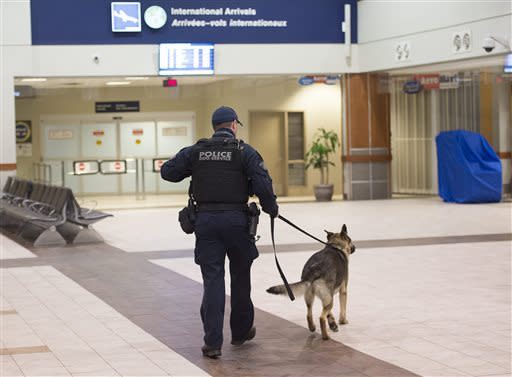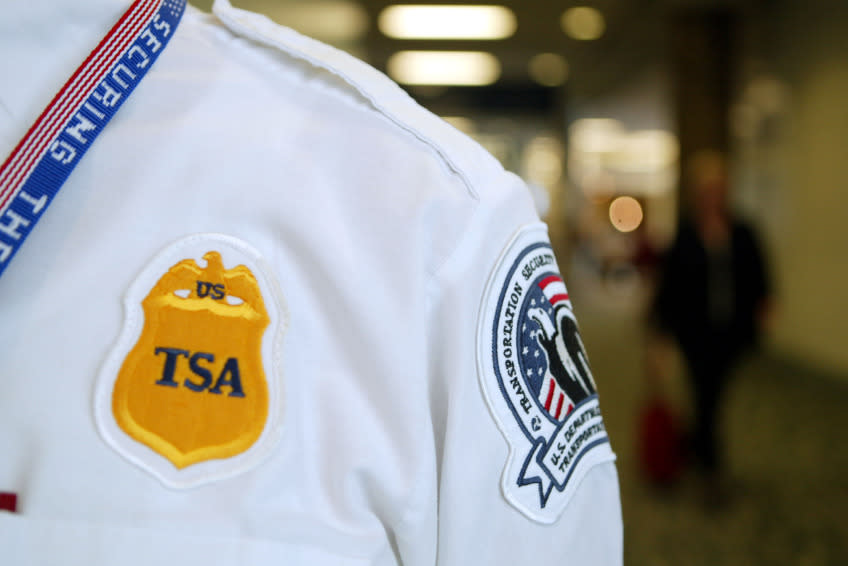What ‘Suspicious Behavior’ Should You Report in the Age of Terrorism?
Days after 129 people were killed in that terrorist attack in Paris, and weeks after 224 people died in an apparent bombing of a Russian charter jet in Egypt, people are on edge. No one is taking any chances, especially on airplanes.

Following recent attacks, passengers are extra vigilant about reporting suspected terrorism. (Photo: AP)
Tuesday night, two separate Air France flights headed for Paris from the U.S. were diverted because of bomb threats. One flight that originated from Los Angeles International Airport was diverted to Salt Lake City. A second flight from Washington Dulles International Airport was diverted to Halifax, Nova Scotia. No word on whether anything was found on either plane.

Two Air France planes bound from the U.S. to Paris were diverted Tuesday night due to bomb threats. (Photo: AP)
While airlines are acting on specific threats, even nonspecific worries are enough to provoke a reaction. Earlier Tuesday, the Associated Press reported that four people — a husband and wife traveling together, a relative, and another man sitting near them — were removed from a Chicago-bound Spirit Airlines flight at BWI Marshall Airport. The captain had them removed after a passenger reported what she believed was suspicious behavior.
What was the suspicious behavior that set off this passenger’s alarm bells? According to the Chicago Tribune, she became nervous when a man who appeared to be of Middle Eastern descent was watching a news report on his phone; an airport official says that news video prompted the passenger to grab her young daughter and rush to the back of the plane while it was taxiing. The plane returned to the gate and the four people were removed, although they were released hours later without charges.
Related: Passengers Removed From Flight After Report of Suspicious Activity
In just over two weeks, 400 people have been killed in terrorist attacks around the world (in addition to the tragedies in Paris and Egypt, there were bombings in Beirut and Baghdad). Security experts believe all of this will cause more people to report things they believe to be suspicious.
WATCH: High Anxiety at Airports and on Planes in the United States After Deadly Paris Attacks
“All that creates a nervousness among the traveling public — a sense of heightened awareness,” airline security expert Anthony Roman, founder of the New York-based security firm Roman & Associates, tells Yahoo Travel. "That sense of heightened awareness will now cause the average passenger to look around more in the terminals, to watch individuals that they believe are behaving suspiciously.”
Problem is, sometimes all that vigilance turns into a false alarm.
“Often enough people are singled out because they look/smell/sound ‘foreign’ or different,” Richard Bloom, a professor and airline security expert at Embry-Riddle Aeronautical University in Prescott, Ariz., tells Yahoo Travel. “Often their English seems not be ‘very good.’ Or stereotypical behaviors linked to terrorism from novels, films, videos, and news accounts are misinterpreted.” He says such incidents can even result from a fearful passenger having a bad day.
Related: Traveling in the Middle East in the Wake of the Paris Terror Attacks
With “if you see something, say something” still the standing (and vague) anti-terrorism advice the general public gets from law enforcement, it might be hard to tell what that “something” is. Here’s some expert advice on what to look for, and what not to look for.
1. Avoid racial profiling.

Why racial profiling isn’t effective. (Photo: iStock)
While he doesn’t think it’s very common, Roman believes that some passengers do engage in racial profiling.
“‘Let me look at a dark-skinned male who appears to be of Middle Eastern descent more closely than I’d look at a white-skinned male who is behaving in a similar fashion,’” is how Roman describes the racial profiler’s school of thought. Roman calls that mentality a mistake, not because of political correctness concerns, but because in this day and age such profiling isn’t very effective.
“We no longer know what a member of ISIS looks like,” Roman says, pointing out that people of all different nationalities and races have attempted to join Islamic terrorist groups. “There are Westerners in ISIS,” he says. “There are all different kinds of races in ISIS. And probably not as well known, there are white, blue-eyed native Middle Easterners as well as there are tan and darker-skinned Middle Easterners.”
Roman believes simple racial profiling may cause one to miss potential threats that do not fit a stereotype. “[Passengers] would be better suited watching behaviors,” he says.
2. Look for specific behavior. Report specific behavior. Do not use the word “suspicious.”

When reporting a fellow passenger, it helps to identify something more specific than “he/she looks suspicious.” (Photo: iStock)
Roman says it’s counterproductive to go to a TSA officer, a cop, or a flight crew member to say “someone is acting suspicious.” Instead, he says you should observe certain behaviors and actions and report those.
Look for people who are acting nervous or fidgety.
“Whenever there’s behavior that seems to suggest someone is more nervous than they should be for a normal flight, that may prompt concern and notification of a TSA officer or a flight attendant,” Roman says. “If they are fidgety, if they’re constantly looking around or what would be called a furtive glance or a furtive movement — all of that should be looked at and watched by the flying public.”
Many airport security officers are already trained to identify certain telltale traits and actions — such as excessive fidgeting and cold sweats — that make a nervous passenger worthy of further investigation. Roman says travelers also keeping an eye out for such behaviors could be a big help.

TSA officers are trained to look for certain behaviors that indicate an excessively nervous passenger. (Photo: iStock)
“Rather than using the statement ‘I’m suspicious’ [when reporting a passenger], say ‘I observed some behavior you might want to know about’ and describe the behavior,” Roman recommends. “Now, the TSA or law enforcement officer may engage in covert surveillance of that person and may find no suspicion at all or may escalate that action to speak to the person and then proceed from there.”
Listen to fellow passengers.
Of course, there’s value in overheard conversation as well. “If a traveler happens to overhear anyone talking about explosive devices or weapons,” says Roman, “or this conversation is coupled with what I described — nervousness, furtive glances left and right, attempts to conceal themselves and place themselves in a corner — those kind of things would be very, very helpful [to security].”
The best part about having specific, concrete behaviors to look for rather than fuzzy, “he looks iffy” feelings is that level of specificity can make you much more likely to act, and less likely to be paralyzed by self-doubt. “Rather than being concerned that you’re going to be an alarmist and therefore not report suspicious behavior,” says Roman, “I believe this method gives the traveler a greater comfort level to report activity of concern and describe that activity rather than reporting it as suspicious.”
3. Trust your instincts.
While Roman and airline security officers do believe in telltale signs of suspicious activity, Bloom has some concerns. “Applied research suggests that there are very few, if any, external behaviors/characteristics predictive of intent to engage in terrorism,” Bloom says. “But many people believe otherwise, perhaps because of a need for comfort based on the belief that the world is a more predictable place than it really is.” Bloom believes the round-the-clock terror discussion we’re seeing in the media may make people more aware of terrorism than perhaps they need to be. “Many people believe that aviation-related terrorism has a much higher probability of occurrence than the facts seem to warrant,” Bloom says.
Related: Is It Safe to Fly? Insiders Say Egypt Crash Could Happen Here
Still, statistics about the rarity of terrorist attacks on airplanes are not much comfort to nervous flyers these days. Along with enhanced screenings and numerous airport guards, empowering travelers to look for danger signs, and to act on them, might provide an extra measure of security that just might ease some of that anxiety.
“Human instinct is very strong, and the traveling public should trust their instinct,” says Roman. “We inherently know as a defense mechanism when another person seems to pose a threat or may be a potential threat. The average person will move away from someone on a train platform or a bus stop or while they’re walking down the street because 'I don’t like the way that person’s behaving.’ It’s our normal instinctive warning net, and we should listen to that. We shouldn’t push it down, because it’s a very useful tool.”
Let Yahoo Travel inspire you every day. Hang out with us on Facebook, Twitter, Instagram, and Pinterest. Check out our original adventure travel series, “A Broad Abroad.”

